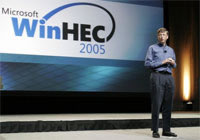 After several years of delays, Microsoft has assured computer-makers that Longhorn, the next version of Windows, is on track for release by the end of next year.
After several years of delays, Microsoft has assured computer-makers that Longhorn, the next version of Windows, is on track for release by the end of next year.
The new operating system has taken so long to appear, even Bill Gates conceded that he was impatient to see the job finished: “Whenever I see those demos, I just think, ‘Gosh (steady on Bill!), let’s get Longhorn done’” the Microsoft overlord told the Windows Hardware Engineering Conference in Seattle.
The software uber giants were at the conference to show off some of the underlying technologies and features planned for Longhorn, originally promised waaaaay back in 2003.
Ol’ Bill was on hand to demonstrate Longhorn’s new graphic interface, claiming that it offers better ways to visualise data, with users being able to see through windows that are stacked on top of each other.
His speech also enthused about Longhorn’s “more natural file organisation” offering faster searching and Microsoft’s big focus on security: “If you had to take one area where we put the most investment in, the security area would be the head of that list by a significant amount,” he said.
![]() Longhorn aims to boost security by placing cryptographic keys in special silicon chips built into PCs – a more secure solution than the current practice of storing encryption locks as data on a hard drive.
Longhorn aims to boost security by placing cryptographic keys in special silicon chips built into PCs – a more secure solution than the current practice of storing encryption locks as data on a hard drive.
This chip would render sensitive files inaccessible, even if the dastardly hacker was trying to boot the machine from a portable hard drive or floppy disk.
Not everyone has welcomed this initiative – christened the Next Generation Secure Computing Base (NGSCB) – with Microsoft cynics, critics and privacy advocates suggesting that it offers a back door for commercial interests to nefariously gain access to personal PCs.
There are also deep suspicions that the chip could be used to enforce highly restrictive DRM schemes for music, movies and software.
A less controversial new feature is Microsoft’s attempt to take on their Macromedia-guzzling rival, Adobe, with a new technology called ‘Metro’.
 This would offer a built-in method to let users view and print graphical documents, without the need to install the application that created the original file – in other words, a rival to Adobe Systems’ popular PDF technology and PostScript page description language.
This would offer a built-in method to let users view and print graphical documents, without the need to install the application that created the original file – in other words, a rival to Adobe Systems’ popular PDF technology and PostScript page description language.
“When I look at Metro, I see PDF and PostScript in the crosshairs,” ruminated Jupiter Research analyst Joe Wilcox. “Adobe is a very successful company, and PDF is an entrenched technology, but Microsoft is doing what it always is trying to do, and that is woo the developers with an alternative.”
Microsoft’s hardware conference comes just a few days before Apple releases its operating system update, Mac OS X Tiger, which offers a fast file-searching feature similar to the one promised in Longhorn.
This similarity has set the two companies at each other throats as they argue about who copied who.
At Apple’s annual meeting last week, CEO Steve Jobs hissed that Microsoft was “shamelessly” copying OS X, cattily adding, “They can’t even copy fast.”
Microsoft group Vice President Jim Allchin was having none of it, claiming that it was Apple that “became fixated on Longhorn” after Microsoft showcased some early file-searching capabilities at a conference in October 2003.
“I think they saw something that we were doing that was pretty cool,” Allchin commented, huffily adding that “There is a question of how much we should show, so that they can try to copy again.”
Longhorn’s long-delayed release in 2006 will mark a full five years since the release of Windows XP – in computer terms, that makes XP almost Neolithic.
 Microsoft has launched MSN Video Downloads, a spanking new mobile service that will provide daily television programming for downloading to Windows Mobile devices, such as Portable Media Centers, Smartphones and Pocket PCs.
Microsoft has launched MSN Video Downloads, a spanking new mobile service that will provide daily television programming for downloading to Windows Mobile devices, such as Portable Media Centers, Smartphones and Pocket PCs. The video content is compliant with ‘PlaysForSure’ video devices, and is optimised for Portable Media Centers and compatible with Smartphones and Pocket PCs that support Windows Media Player 10 Mobile.
The video content is compliant with ‘PlaysForSure’ video devices, and is optimised for Portable Media Centers and compatible with Smartphones and Pocket PCs that support Windows Media Player 10 Mobile. “With content from some of the most recognized brands in entertainment, MSN Video Downloads helps bring this vision to life, allowing people to take their favourite television shows with them whether they are on the train, waiting for a doctor’s appointment, or keeping the kids occupied in the back seat of the car.”
“With content from some of the most recognized brands in entertainment, MSN Video Downloads helps bring this vision to life, allowing people to take their favourite television shows with them whether they are on the train, waiting for a doctor’s appointment, or keeping the kids occupied in the back seat of the car.” All music videos on the site will be made available in multiple formats for playing on traditional PCs, laptops and Microsoft’s Windows Mobile-based secure devices including the Portable Media Centers, Pocket PCs and select Smartphones.
All music videos on the site will be made available in multiple formats for playing on traditional PCs, laptops and Microsoft’s Windows Mobile-based secure devices including the Portable Media Centers, Pocket PCs and select Smartphones. Microsoft has agreed – with all the enthusiasm of a child being made to eat spinach – to adopt all the “main changes” requested by the European Commission to its new version of Windows without Media player components.
Microsoft has agreed – with all the enthusiasm of a child being made to eat spinach – to adopt all the “main changes” requested by the European Commission to its new version of Windows without Media player components. Horacio Gutierrez, a lawyer for Microsoft, was clearly not too happy, telling Reuters that the company has “some misgivings about the chosen name, as we fear it may cause confusion for consumers about the product, but we will adopt the Commission’s name in order to move forward and accelerate the pace of the implementation process.”
Horacio Gutierrez, a lawyer for Microsoft, was clearly not too happy, telling Reuters that the company has “some misgivings about the chosen name, as we fear it may cause confusion for consumers about the product, but we will adopt the Commission’s name in order to move forward and accelerate the pace of the implementation process.” And there’s more! Microsoft are also in disagreement with the EU over plans to appoint a trustee to monitor Microsoft’s compliance (or the complete lack of) – if the company fail to comply with the Commission’s decisions, they could face a daily slapdown of up to US$5 million – the equivalent of a cup of coffee in Bill Gates’ world.
And there’s more! Microsoft are also in disagreement with the EU over plans to appoint a trustee to monitor Microsoft’s compliance (or the complete lack of) – if the company fail to comply with the Commission’s decisions, they could face a daily slapdown of up to US$5 million – the equivalent of a cup of coffee in Bill Gates’ world. Microsoft co-founder and chairman, Bill Gates received an honorary knighthood from ‘er Majesty the Queen today.
Microsoft co-founder and chairman, Bill Gates received an honorary knighthood from ‘er Majesty the Queen today. Gates and his wife Melinda are well known for their charitable work, investing millions in research for an Aids vaccine and a scholarship scheme to enable the brightest students to go to Cambridge University.
Gates and his wife Melinda are well known for their charitable work, investing millions in research for an Aids vaccine and a scholarship scheme to enable the brightest students to go to Cambridge University. Microsoft is teaming up with one of Japan’s hotshot video game developers to create games for its next-generation video game console, XBox2 – a sure-fire sign that it’s determined to grab a fat slice of the Japanese market.
Microsoft is teaming up with one of Japan’s hotshot video game developers to create games for its next-generation video game console, XBox2 – a sure-fire sign that it’s determined to grab a fat slice of the Japanese market.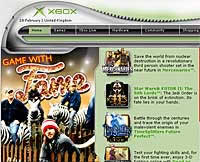 A founding member of former video game software developer Square Co., the 42-year-old is famed for creating the role-playing series, ‘Final Fantasy’, which has shifted more than 60 million copies to date.
A founding member of former video game software developer Square Co., the 42-year-old is famed for creating the role-playing series, ‘Final Fantasy’, which has shifted more than 60 million copies to date.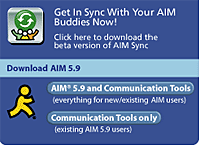 America Online has announced plans to enable users of its instant messaging service (AIM) to see when friends and business associates are online, even if they’re not on the contact list.
America Online has announced plans to enable users of its instant messaging service (AIM) to see when friends and business associates are online, even if they’re not on the contact list.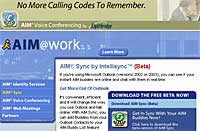 AOL has also announced a relationship with CareerBuilder.com to bring together recruiters and online job applicants. A prospective employer, who spots a job seeker’s résumé with an AIM address, can instantly send a message to that person in real time.
AOL has also announced a relationship with CareerBuilder.com to bring together recruiters and online job applicants. A prospective employer, who spots a job seeker’s résumé with an AIM address, can instantly send a message to that person in real time.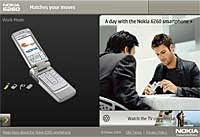 In return Microsoft will also be supporting OMA DRM and AAC music format in their Windows Media player, via a plug in.
In return Microsoft will also be supporting OMA DRM and AAC music format in their Windows Media player, via a plug in. In a litigious pincer movement,
In a litigious pincer movement,  After receiving a sound pummelling in previous rounds against the mighty Google, Microsoft has produced a leaner, meaner more bad-ass search engine – and this one looks like it might go the distance.
After receiving a sound pummelling in previous rounds against the mighty Google, Microsoft has produced a leaner, meaner more bad-ass search engine – and this one looks like it might go the distance.